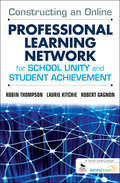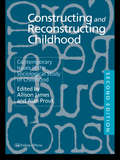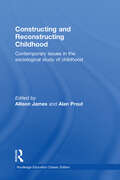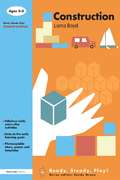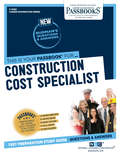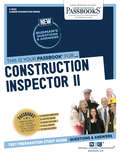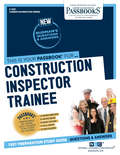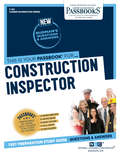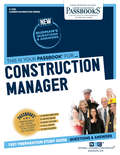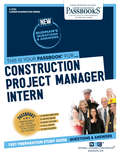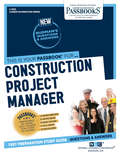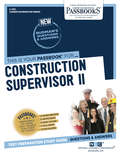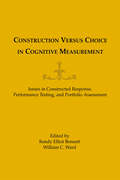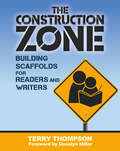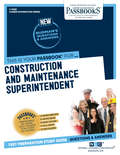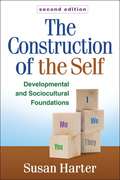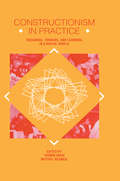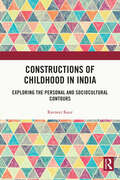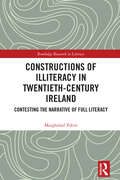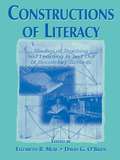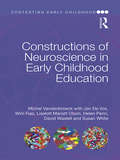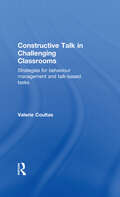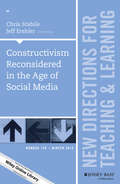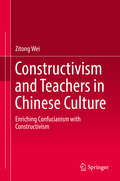- Table View
- List View
Constructing an Online Professional Learning Network for School Unity and Student Achievement
by Dr Robin C. Thompson Laurie C. Kitchie Mr Robert J. GagnonAdvance your professional learning community into the digital age What if you had a school-based online forum for sharing lesson plans, student work, or a new curriculum? You can! The authors explain how they created an online professional learning network and provide all the tools needed to construct an online network to fit your school’s needs. Benefits include: Enhanced communication among teachers, administrators, and the community Easy access to professional development for many more participants Implementation of best practices and instructional strategies for improved teacher performance Increased understanding of and commitment to reaching educational goals
Constructing and Reconstructing Childhood: Contemporary Issues in the Sociological Study of Childhood
by Allison James Alan ProutFirst published in 1997. Routledge is an imprint of Taylor & Francis, an informa company.
Constructing and Reconstructing Childhood: Contemporary issues in the sociological study of childhood (Routledge Education Classic Edition Ser.)
by Allison James Alan ProutWhen the first edition of this seminal work appeared in 1990, the sociology of childhood was only just beginning to emerge as a distinct sub-discipline. Drawing together strands of existing sociological writing about childhood and shaping them into a new paradigm, the original edition of this Routledge Classic offered a potent blend of ideas that informed, even inspired, many empirical studies of children’s lives because it provided a unique lens through which to think about childhood. Featuring a collection of articles which summarised the developments in the study of childhood across the social sciences, including history, psychology, sociology, anthropology, feminist and developmental studies, scholars and professionals from developed and developing countries world-wide shared their knowledge of having worked and of working with children. Now with a new introduction from the editors to contextualise it into the 21st century, this truly ground-breaking text which helped establish childhood studies as a distinctive field of enquiry is being republished.
Construction (Ready, Steady, Play!)
by Lorna BoydFirst Published in 2006. Routledge is an imprint of Taylor & Francis, an informa company.
Construction Cost Specialist: Passbooks Study Guide (Career Examination Series)
by National Learning CorporationThe Construction Cost Specialist Passbook® prepares you for your test by allowing you to take practice exams in the subjects you need to study. It provides hundreds of questions and answers in the areas that will likely be covered on your upcoming exam.
Construction Inspector II: Passbooks Study Guide (Career Examination Series)
by National Learning CorporationThe Construction Inspector II Passbook® prepares you for your test by allowing you to take practice exams in the subjects you need to study. It provides hundreds of questions and answers in the areas that will likely be covered on your upcoming exam.
Construction Inspector Trainee: Passbooks Study Guide (Career Examination Series)
by National Learning CorporationThe Construction Inspector Trainee Passbook® prepares you for your test by allowing you to take practice exams in the subjects you need to study. It provides hundreds of questions and answers in the areas that will likely be covered on your upcoming exam, including but not limited to: understanding and interpreting technical instructions and dimensional drawings; interpretation of charts, graphs and tables; basic mathematics, including geometric figures; arithmetic computations; and other related areas.
Construction Inspector: Passbooks Study Guide (Career Examination Series #C-765)
by National Learning CorporationThe Construction Inspector Passbook® prepares you for your test by allowing you to take practice exams in the subjects you need to study. It provides hundreds of questions and answers in the areas that will likely be covered on your upcoming exam.
Construction Manager: Passbooks Study Guide (Career Examination Series)
by National Learning CorporationThe Construction Manager Passbook® prepares you for your test by allowing you to take practice exams in the subjects you need to study. It provides hundreds of questions and answers in the areas that will likely be covered on your upcoming exam.
Construction Project Manager Intern: Passbooks Study Guide (Career Examination Series)
by National Learning CorporationThe Construction Project Manager Intern Passbook® prepares you for your test by allowing you to take practice exams in the subjects you need to study. It provides hundreds of questions and answers in the areas that will likely be covered on your upcoming exam, including but not limited to: construction techniques, materials, equipment and methodology; safety practices; contracts, plans and specifications; basic mathematics; record keeping; and more.
Construction Project Manager: Passbooks Study Guide (Career Examination Series)
by National Learning CorporationThe Construction Project Manager Passbook® prepares you for your test by allowing you to take practice exams in the subjects you need to study. It provides hundreds of questions and answers in the areas that will likely be covered on your upcoming exam.
Construction Supervisor II: Passbooks Study Guide (Career Examination Series)
by National Learning CorporationThe Construction Supervisor II Passbook® prepares you for your test by allowing you to take practice exams in the subjects you need to study. It provides hundreds of questions and answers in the areas that will likely be covered on your upcoming exam.
Construction Versus Choice in Cognitive Measurement: Issues in Constructed Response, Performance Testing, and Portfolio Assessment
by William C. Ward Randy Elliot BennettThis book brings together psychometric, cognitive science, policy, and content domain perspectives on new approaches to educational assessment -- in particular, constructed response, performance testing, and portfolio assessment. These new assessment approaches -- a full range of alternatives to traditional multiple-choice tests -- are useful in all types of large-scale testing programs, including educational admissions, school accountability, and placement. This book's multi-disciplinary perspective identifies the potential advantages and pitfalls of these new assessment forms, as well as the critical research questions that must be addressed if these assessment methods are to benefit education.
Construction Zone: Building Scaffolds for Readers and Writers
by Terry ThompsonInstructional scaffolding is an essential part of teaching literacy. But what is scaffolding exactly? What does it look like in a classroom, and how can we improve the ways we use it? Despite its prominence in the repertoire of teaching strategies, scaffolding remains a vague concept for many teachers. ' In essence, scaffolding is the idea of supporting students as they build independence. In The Construction Zone: Building Scaffolding for Readers and Writers, Terry Thompson identifies four critical processes to deepen your understanding and improve your practice of instructional scaffolding: ·' ' ' ' ' ' ' ' Finding and maintaining a specific focus ·' ' ' ' ' ' ' ' Practicing flexibility in planning and delivering instruction ·' ' ' ' ' ' ' ' Giving constructive feedback in response to student efforts ·' ' ' ' ' ' ' ' Monitoring to ensure that students are working at optimal levels of responsibility Thompson' encourages teachers to enhance their use of the traditional gradual release process through five actionable steps: show, share, support, sustain, and survey, and in doing so provides procedures and techniques to help them establish and maintain strong scaffolds throughout the instructional day. The Construction Zone is written from the teacher's perspective and urges educators to fully embrace their role in the scaffolding process while staying mindful of the effect it has on students. ' Taking a student from dependence upon the teacher to independent learning is what teaching is all about, and instructional scaffolding is key to accomplishing this goal. Regardless of where you are in your understanding of instructional scaffolding, The Construction Zone will raise your level of awareness around your instructional practices and the ways you scaffold students to independence.' '
Construction and Maintenance Superintendent: Passbooks Study Guide (Career Examination Series)
by National Learning CorporationThe Construction and Maintenance Superintendent Passbook® prepares you for your test by allowing you to take practice exams in the subjects you need to study. It provides hundreds of questions and answers in the areas that will likely be covered on your upcoming exam, including but not limited to: practices, processes and material used in general building maintenance and construction work; crafts and trades employed in general construction work; use of construction and maintenance equipment and machinery; proper safety practices and procedures, including pertinent Federal, state and local laws and regulations; personnel rules and practices; and more.
Construction of the Self, Second Edition
by Susan Harter William M. BukowskiAn important work from a leading scholar, this book explores self-development from early childhood to adulthood. Susan Harter traces the normative stages that define the emergence of many self-processes, including self-esteem. She also addresses individual differences and societal influences on self-development. Presenting pioneering empirical research, Harter shows that increasingly mature features of the self have both benefits and liabilities for psychological adjustment. The book highlights the causes and consequences of different types of self-representations, including those that are unrealistically negative or positive. New to This Edition Reflects more than a decade of conceptual, empirical, and methodological advances. Provides a broader sociocultural framework for understanding self development. Chapters on emerging adulthood, self-esteem and physical appearance, self-processes in the classroom, motivation, cross-cultural issues, and the quest for authenticity. Expanded chapters on childhood, adolescence, and the self-conscious emotions, including humiliation. Increased attention to the liabilities of our contemporary preoccupation with the self.
Constructionism in Practice: Designing, Thinking, and Learning in A Digital World
by Mitchel Resnick Yasmin KafaiThe digital revolution necessitates, but also makes possible, radical changes in how and what we learn. This book describes a set of innovative educational research projects at the MIT Media Laboratory, illustrating how new computational technologies can transform our conceptions of learning, education, and knowledge. The book draws on real-world education experiments conducted in formal and informal contexts: from inner-city schools and university labs to neighborhoods and after-school clubhouses. The papers in this book are divided in four interrelated sections as follows: * Perspectives in Constructionism further develops the intellectual underpinnings of constructionist theory. This section looks closely at the role of perspective-taking in learning and discusses how both cognitive and affective processes play a central role in building connections between old and new knowledge. * Learning through Design analyzes the relationship between designing and learning, and discusses ways that design activities can provide personally meaningful contexts for learning. This section investigates how and why children can learn through the processes of constructing artifacts such as games, textile patterns, robots and interactive devices. * Learning in Communities focuses on the social aspects of constructionist learning, recognizing that how people learn is deeply influenced by the communities and cultures with which they interact. It examines the nature of learning in classroom, inner-city, and virtual communities. * Learning about Systems examines how students make sense of biological, technological, and mathematical systems. This section explores the conceptual and epistemological barriers to learning about feedback, self-organization, and probability, and it discusses new technological tools and activities that can help people develop new ways of thinking about these phenomena.
Constructions of Childhood in India: Exploring the Personal and Sociocultural Contours
by Ravneet KaurThis book explores the dominant constructions of childhood as perceived by children and adults in contemporary Indian society. It unveils the everyday lived experiences of children within family life to explain the meaning of childhood and the position of children as social groups. Based on detailed qualitative study, this volume discusses the themes and issues that impact dominant constructions of childhood. It establishes childhood as a structurally constructed category and sheds light on how key social differences influence the diverse experiences of childhood. The book critically examines how children, as social actors, contribute to the structural space of childhood through the recognition of their own experiences, voices, and ways of interpretations. Further, it also compares and analyses childhoods of today with those of the past generations. Engagingly written and nuanced, the book will be of great interest to teachers and students of education, childhood studies, elementary education, sociology of education and social psychology. It will also be useful for teachers of teacher training institutions, policymakers, educationalists, education professionals, parents and researchers working with children and childhood studies.
Constructions of Illiteracy in Twentieth-Century Ireland: Contesting the Narrative of Full Literacy (Routledge Research in Literacy)
by Maighréad TobinConstructions of Illiteracy in Twentieth Century Ireland: Contesting the Narrative of Full Literacy offers new insights into literacy and illiteracy in the context of twentieth-century Ireland. Through a close analysis of archived documentation from educational, military, and parliamentary sources, the book reveals a potent narrative of full literacy that promoted literacy proficiency as a facet of the Irish national identity and suppressed any formal acknowledgment of illiteracy within the adult population. Tobin applies a sociological approach and uses Foucauldian concepts of knowledge, power, discourse, and silence to examine how constructions of illiteracy and the “illiterate person” varied over time, while being consistently bound to nationalism and nation-building in the twentieth century. Though focused on Irish society from 1900-1980, this volume also offers a resonant lens through which to examine the aims of the “Decade of Centenaries,” an Irish Government initiative spanning 2012-2023 that commemorates significant events in the history of the Irish state. Relevant to any readers with an interest in the Irish experience of independence, decolonisation, and postcolonialism, this book will be a useful companion for scholars and postgraduate students of literacy and Irish studies more broadly.
Constructions of Literacy: Studies of Teaching and Learning in and Out of Secondary Classrooms
by Elizabeth B. Moje David G. O’BrienConstructions of Literacy explores and represents, through a series of cases and commentaries, how and why secondary school teachers and students use literacy in formal and informal learning settings. As used in the context of this book, secondary literacy refers to speaking, listening, reading, writing, and performing. It also refers to how these processes or events are constructed, negotiated, and used for specific purposes by teachers and students as they engage in various classroom, school, and community practices and interactions. The authors operate from a stance that literacy is socially, culturally, and historically constructed. They recognize that there are many different perspectives on how that construction occurs--some arguing for institutional and structural influences--others suggesting that people have some degree of agency within the constraints imposed by larger structures. A distinguishing feature of the volume is that the contributors explore and make explicit differing perspectives on literacy as a social construction. The volume is built around case studies of secondary school teachers' and students' literacy practices inside and outside of schools. The cases include diverse (critical, cultural, feminist, interpretive, phenomenological, and postmodern) theoretical and epistemological perspectives and research methodologies, making this one of the first collections of studies in secondary content area classrooms conducted from multiple perspectives. It concludes with two Commentaries, one by Donna Alvermann and one by David Bloome, in which they discuss and critique the contributions made from the different perspectives and grapple with how they simultaneously illuminate and confuse issues in literacy theory, research, and practice. Preservice and in-service teachers, school professionals, and researchers in literacy education, secondary education, and curriculum theory will find this book stimulating and informative. It will help them analyze the complexities of secondary literacy teaching and learning, and examine their own understandings of literacy within their own literacy contexts.
Constructions of Neuroscience in Early Childhood Education
by Jan De Vos Helen Penn Sue White Michel Vandenbroeck Dave Wastell Liselott Mariett Olsson Wim FiasThis book explores and critiques topical debates in educational sciences, philosophy, social work and cognitive neuroscience. It examines constructions of children, parents and the welfare state in relation to neurosciences and its vocabulary of brain architecture, critical periods and toxic stress. The authors provide insight into the historical roots of the relationship between early childhood education policy and practice and sciences. The book argues that the neurophilia in the early childhood education field is not a coincidence, but relates to larger societal changes that value economic arguments over ethical, social and eminently pedagogical concerns. It affects the image of the child, the parent and the very meaning of education in general. Constructions of Neuroscience in Early Childhood Education discusses what neuroscience has to offer, what its limitations are, and how to gain a more nuanced view on its benefits and challenges. The debates in this book will support early childhood researchers, students and practitioners in the field to make their own judgements about new evolutions in the scientific discourse.
Constructive Controversy
by David W. JohnsonWhy do people make decisions based on their own perspective without considering alternative points of view? Do differences of opinion enhance or obstruct critical thinking? Is it wise to seek out people who disagree with you and listen to their objections to your conclusions? Focusing on the theory, research, and application of constructive controversy, this book analyses the nature of disagreement among members of decision-making groups, project teams, academic study groups, and other groups that are involved in solving problems. Johnson demonstrates that this theory is one of the most effective methods of enhancing creativity and innovation, decision making, teaching, and political discourse. The book includes entertaining and intriguing examples of how constructive controversy has been used in a variety of historical periods to advance creativity, achieve innovations, and guide democracies. It will be welcomed by students in the fields of social psychology, management/business studies, education, and communication studies.
Constructive Talk in Challenging Classrooms: Strategies for Behaviour Management and Talk-Based Tasks
by Valerie CoultasConstructive Talk in Challenging Classrooms gives the practising teacher advice on how to make learning fun through the use of ‘talk’ and collaborative group work. Using clear examples, tried and tested in some of the most challenging classrooms in inner city schools, the book offers practical and honest advice on both the difficulties and rewards that can be gained when employing all forms of talk-based teaching in the classroom. Packed with real examples of successful talk based lessons with children of all abilities and needs, this book will show teachers how they can succeed in overcoming problems of disruption and engage even the most difficult pupils in real learning through talk. The book shows that bringing the child's individual experience into a lesson through talk has huge emotional and psychological benefits – this can be particularly marked in classrooms where there are low levels of literacy, behaviour issues or where pupils’ first language is not English. The author argues that talk is vital for building positive relationships and essential for successful teaching, particularly in the difficult classrooms. This inspiring title is essential reading for any teacher interested in building trust and making learning fun and meaningful for all.
Constructivism Reconsidered in the Age of Social Media: New Directions for Teaching and Learning, Number 144 (J-B TL Single Issue Teaching and Learning)
by Chris Stabile Jeff ErshlerNo longer relegated to just the classroom, learning has become universal through the use of social media. Social media embodies constructivism itself as the users engage in the development of their own meaning. And, constructivism is relevant to education, and learning theory and technological advance can be better understood in the light of one another. This volume explores: particular areas influenced by constructivist thinking and social media, such as student learning, faculty development, and pedagogical practices, practical and useful ways to engage in social media, and dialogue and discussions regarding the nature of learning in relation to the technology that has changed how both faculty and students experience their educational landscape. This is the 144th volume of this Jossey-Bass higher education series. It offers a comprehensive range of ideas and techniques for improving college teaching based on the experience of seasoned instructors and the latest findings of educational and psychological researchers.
Constructivism and Teachers in Chinese Culture: Enriching Confucianism with Constructivism
by Zitong WeiThis book provides a refreshing look at kindergarten teachers’ practical knowledge and their context-specific reasoning of the usefulness of constructivism from a culturally emic perspective. Examining the similarities and differences between constructivism and Confucianism from both instructional and moral perspectives, it provides a unique contribution to teaching and teacher education. An understanding of the compatibility between constructivism and Confucianism is valuable in cross-cultural exchange and learning, and as such the book is a great source for educational researchers in a time of globalization.
